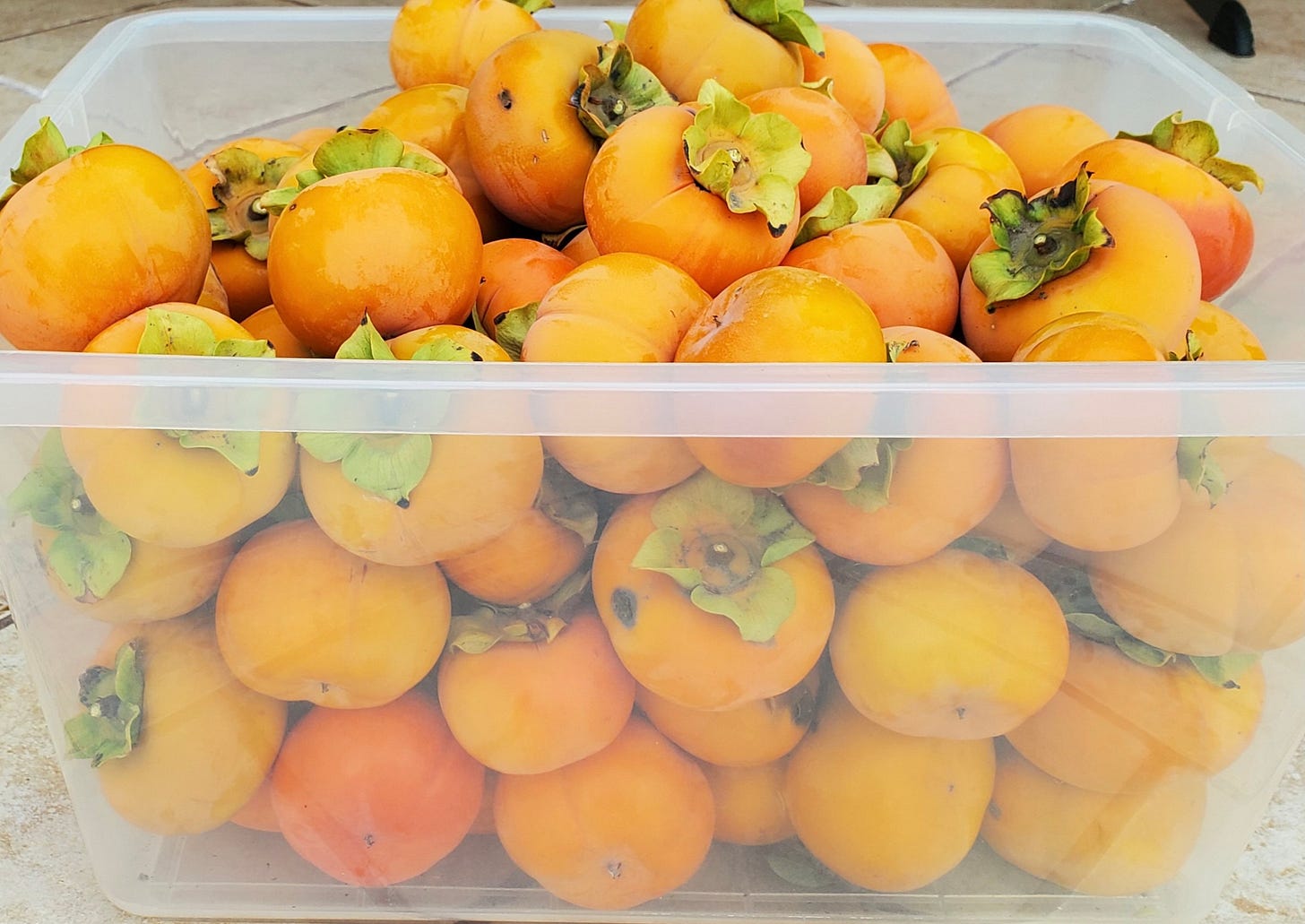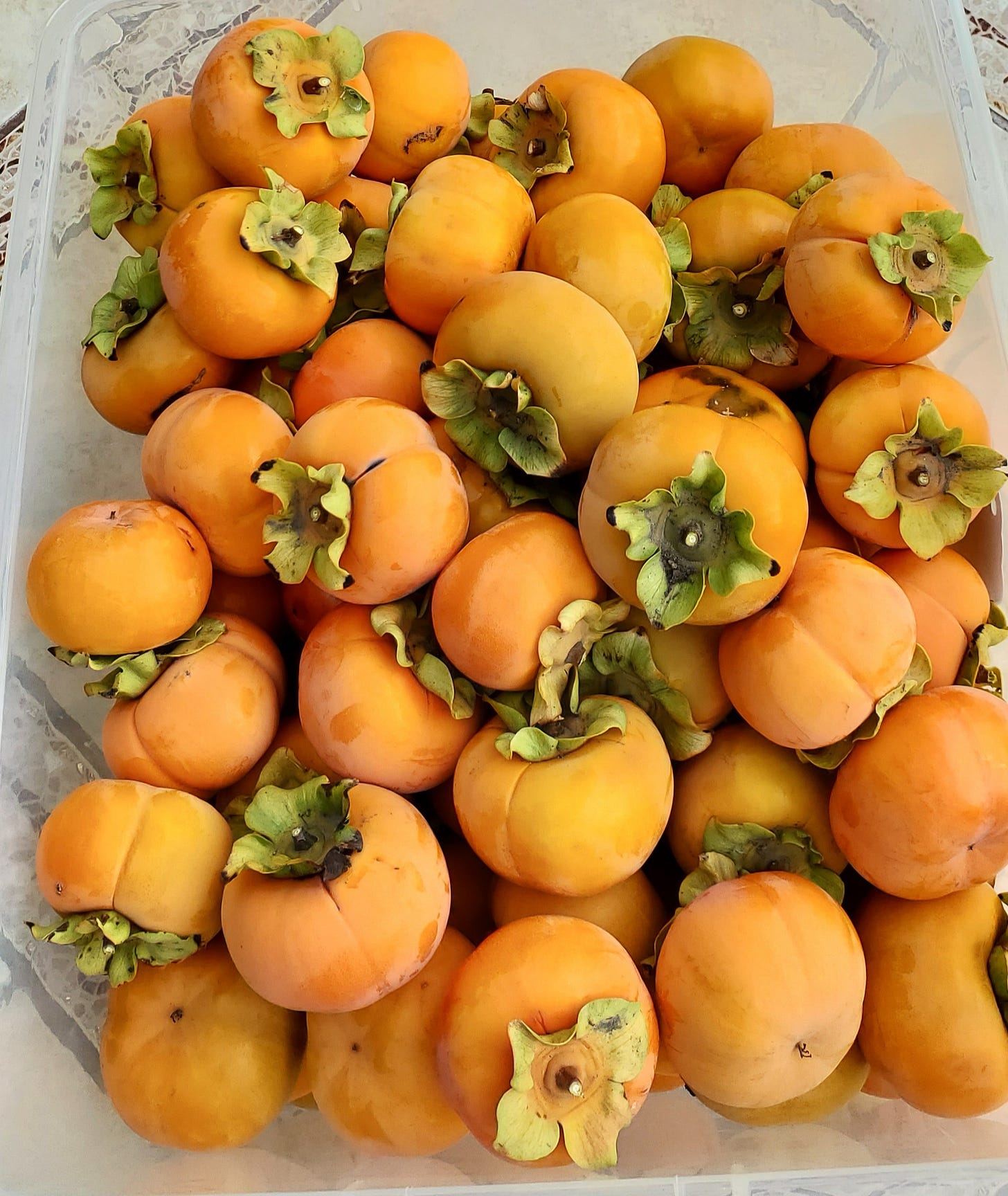THIS IS GOOD ENOUGH
In a year in which we harvested basketfuls of grapes, figs and persimmons, the word “plenty” became burdensome. Is it really good to have so much?
On Halloween morning, my husband harvested half the persimmons on our tree. At the end of the harvest, the plastic bin overflowing with fruit was so heavy he struggled to carry it into the house. Two months prior, we’d harvested several bowls of figs. Climate change and the fires here in Northern California in 2020—and certainly Covid—did a number on our kumquat tree and hence we didn’t have even a normal kumquat crop this year. But our vines… Just where do I even begin?
Our “vineyard” is diminutive compared to those rising in the expansive backyards of friends here in Silicon Valley. In contrast, ours are just two reedy grape vines in a narrow side yard. By May, they preen under the azure yonder; by early June, they are swollen with leaves. Broad, green blades etched against the redwood trellis and the blue of the sky. Right in there, playing hide and seek, are dozens of darkening clusters of fruit. Shiny tight bunches hanging with the assurance of immortal plastic flora in the aisles of Michaels Stores. Beckoning us to peek in wonder between tendrils and leaves.
Now, several months after we’d picked our grapes, the leaves of the two vines are burnished a blood red by the autumnal chill. So different from late July when they reeked of fermenting wine whenever I ambled past them. In early August, my husband and I snipped off one cluster after another, filling bowls and trays. On several weekends, grape management became a chore.
We washed the fruit and dried them on bath towels on the counter to ensure that the bugs were gone. We dried the clusters and turned them over and patted them dry. As the sugar intensified on the vine, our fridge bore more and more shelves of the fruit. Grape eating is so much sweeter than picking. Consider the debris of a grape harvest: Squished fruit under the vine; sticky spots on the counter; a bag of raisins; and a myriad of stems clogging the sink.
Between the stocking and shelving, we dropped off our grapes to as many friends as we could. We even carted some to New York to our children and cousins and friends. A friend with an early onset of diabetes was tentative about accepting our fruit. She dropped the grapes we gave her into her blender and brought the liquid back to us even though we were already drowning in grape juice.
Right about the time of the harvest, we learned that an Indian-American friend of many years had made many millions of dollars in just one year as part of his salary. Of course I was envious. And honestly, who wouldn’t be? The juice of the green-eyed monster lurks deep within us all, staining our psyche during unexpected moments.
My envy over our friend’s riches passed soon enough as I came upon a literal “grapes are sour” moment. I recalled the fable about King Midas and the Golden Touch. King Midas wanted everything he touched to turn into gold. To his delight, his wishes came true. The consequences of his ceaseless greed would visit him on the day he hugged his child. His hands were, literally, paralyzed by his greed when she turned into a lifeless statue of gold. The price of excess was powerlessness.
As we took stock of our bountiful grapes on the day of our harvest, I began to wonder whether too many grapes or too much money—really, plenty of anything—was a pleasant enterprise, after all.
“Just imagine that each of these clusters is one million dollars,” I said to my husband. “Can you imagine how stressful it is to have so much money that you must fret about how to spend it well, how to give it away thoughtfully and then, how exactly to store or gift your wealth in such a manner that the taxes don’t wear you down?”
I dropped several bunches of grapes into a bag destined for a friend and handed them to my husband in annoyance. “Money management is so much work. Just as this non-trivial grape management.” My husband rolled his eyes heavenward. After all, he had said that to me throughout the course of our marriage. Here I was relaying it back to him in juvenile frenzy.
He had stayed loyal to a mammoth of an old company and had never been part of the Silicon Valley culture of wheeling, dealing and company building even though he had been an aggressive, active participant in the technical spheres of valley life. He had never cared that some people with similar or fewer credentials had struck gold by starting companies. He had stood his ground whenever I’d accused him of not having that burning desire for both risk and concomitant wealth accumulation.
“Why didn’t he have what they called “affluenza”, the single-minded pursuit of accumulating wealth and success?” I’d ask.
“But how much more do we need?” he’d retort. He’d ask me when it would ever be enough, when we would ever declare that something was enough. He’d point to our privileges. “We’ve bought a home. We’ve put our children through college,” he’d say. “We have enough on which to retire—and a little more. That will be enough.”
Today, I realize that my husband and I are fortunate to be able to declare that we have enough. How many of us can? It took a certain courage to say “enough” in a cut-throat valley culture where saying “enough” is often shunned and perceived as a lack of ambition. Furthermore, even reflecting on the subject of how much we needed to live on is a privilege that few people could afford, even in these United States. I had to stop and count my blessings. There was much to be grateful for, starting with our fruit harvests through this calendar year.
The week before Thanksgiving we harvested our second batch of persimmons and our tree seems relieved and finally upright, bracing for the unexpected bleariness of a Northern Californian winter.
On Thanksgiving Thursday, we will sit down with our friends, thankful for all that we have. We’ll be thankful—for having enough and not that much more. Happy Thanksgiving!







Great article! As you point out, we have much to be thankful for, but overabundance can be a problem too! It’s time to cut back and start sharing, both for our peace of mind and for the planet. Perhaps we can try sites like second harvest, ripenear.me or Olioex.com to share produce, and use sites like Freecycle, BuyNothing to cut back on shopping or try what this column advises -
https://www.nytimes.com/2021/11/07/opinion/culture/holiday-gift-shopping-secondhand.html?referringSource=articleShare
Outstanding piece - hits home at a time when I am shedding and trying to mimimize